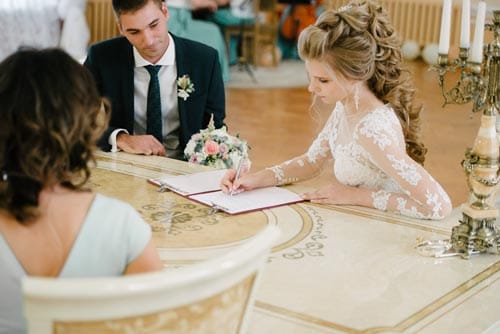
There is a lot to consider when performing a wedding — especially for first-time officiants who are still learning the ropes. You’ll need to iron out details such as what to wear, what to include in the script, and what your fee will be. While those are all important considerations, you cannot lose sight of your chief responsibility as the officiant: ensuring the ceremony is legally binding.
Ordinations from the Universal Life Church are no different from those granted by traditional religious organizations. As such, ULC officiants must take care to follow all standard legal protocols. Your job as a wedding officiant is to understand the necessary requirements for a legal ceremony, communicate them to the couple, and make sure they are properly completed.
Let’s walk through the steps one by one:
1. Become a Minister
At the risk of pointing out the obvious, the very first step to performing a legal ceremony is to become an ordained minister. This process couldn’t be more straightforward: just fill out and submit an online application here on our website. Once your ordination is processed, you’ll be confirmed as a legal wedding officiant! This new title will authorize you to perform wedding ceremonies across the United States.
2. Get Your Ordination Documents
Prior to the ceremony, you may be required to register with local marriage officials. If they ask to verify your ordination status, you’ll want to have copies of your physical documents on hand. Most new ministers choose to order the Classic Wedding Package, which comes with a set of legal ordination documents along with some helpful instructional materials.
Even if you won’t be registering at a government office, it’s still a good idea to keep proof of your ordination handy. Online ordination is a relatively novel concept, and not everyone is familiar with it. Some people may even be skeptical of its legitimacy (although this is becoming increasingly less common). In any event, you can quickly put to bed any lingering skepticism about your status by presenting your church-issued documentation.
3. Understand Wedding Laws
Each state has distinct laws regarding marriage. If you’re going to preside over a wedding, it’s important that you understand both the common themes within marriage law, as well as the specific statutes that apply to your particular state or county. You can use our official Wedding Laws Map to determine if there are any additional requirements or legal quirks in your area that will need to be addressed.
4. Research Rules for Marriage Licenses
After the ceremony, it’s your job to make sure the marriage license is correctly filled out. Without completing this step of the process, the marriage is not considered legal. The day of the wedding is sure to be hectic and eventful, so schedule a time to sit down with the couple and get this done.
As is often the case with marriage laws, each state and county has different rules for marriage licenses. It’s necessary for you, as the officiant, to understand and follow these rules carefully. Because the process can be a bit confusing, we’ve created a specific guide for how to fill out a marriage license.
Note: if the couple has deeper questions about the legal aspects of the marriage license, it’s probably best to direct them to an attorney.

5. Create a Legal Wedding Script
With so many other things to think about, don’t overlook the importance of the ceremony script! A wedding script is equal parts form and function. In one sense, you and the couple have wide leeway in how you want to structure the ceremony and what elements to include. However, there are a few specific aspects that must be part of the ceremony for legal reasons.
The two key components that make the ceremony legally-recognized are the Declaration of Intent (when you ask, “Do you take …” and the couple says, “I do”) and the Pronouncement (when you officially pronounce the couple as married). Double check your wedding script before the ceremony to make sure both these parts are included. For some example wedding scripts, visit the ULC's Wedding Script Generator hub for several templates at your disposal. There's scripts that are inclusive of several religions from Christian, Jewish, Muslim, and many other types of spiritual ceremonies.
That’s it! Following the simple steps laid out above will allow the couple to confidently enter married life knowing that their union is official in the eyes of the law.

